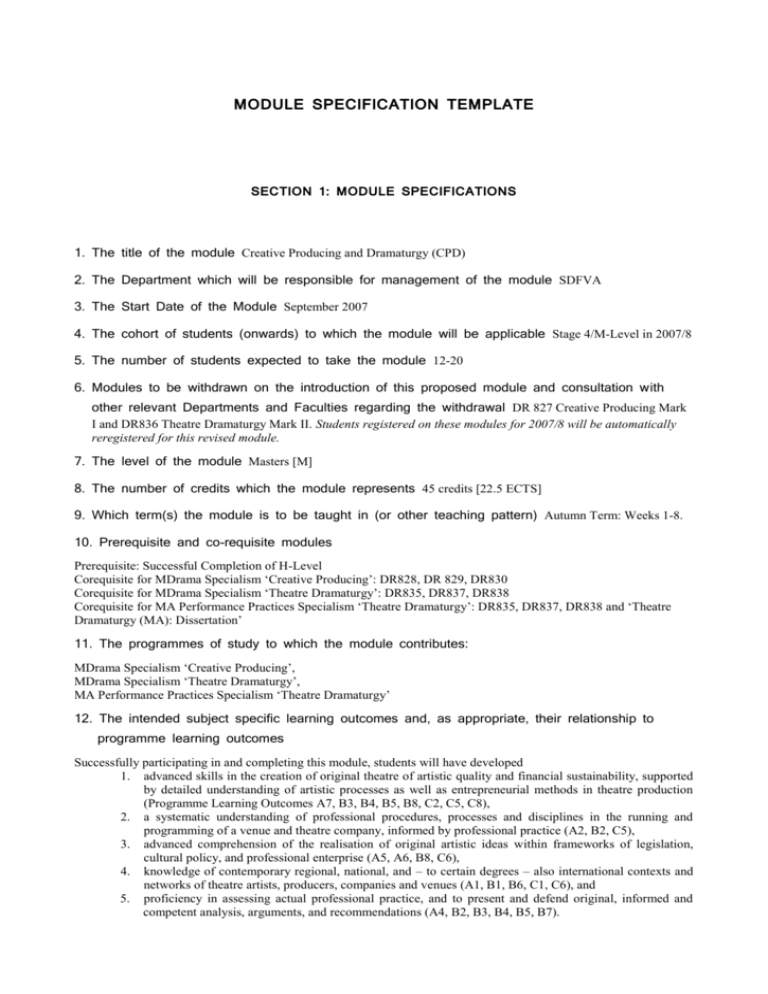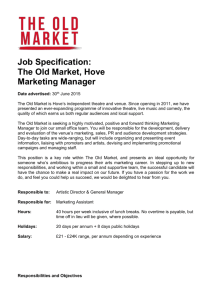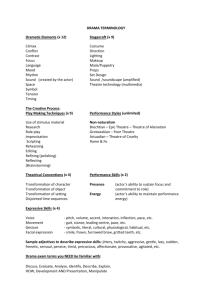University of Kent at Canterbury
advertisement

MODULE SPECIFICATION TEMPLATE SECTION 1: MODULE SPECIFICATIONS 1. The title of the module Creative Producing and Dramaturgy (CPD) 2. The Department which will be responsible for management of the module SDFVA 3. The Start Date of the Module September 2007 4. The cohort of students (onwards) to which the module will be applicable Stage 4/M-Level in 2007/8 5. The number of students expected to take the module 12-20 6. Modules to be withdrawn on the introduction of this proposed module and consultation with other relevant Departments and Faculties regarding the withdrawal DR 827 Creative Producing Mark I and DR836 Theatre Dramaturgy Mark II. Students registered on these modules for 2007/8 will be automatically reregistered for this revised module. 7. The level of the module Masters [M] 8. The number of credits which the module represents 45 credits [22.5 ECTS] 9. Which term(s) the module is to be taught in (or other teaching pattern) Autumn Term: Weeks 1-8. 10. Prerequisite and co-requisite modules Prerequisite: Successful Completion of H-Level Corequisite for MDrama Specialism ‘Creative Producing’: DR828, DR 829, DR830 Corequisite for MDrama Specialism ‘Theatre Dramaturgy’: DR835, DR837, DR838 Corequisite for MA Performance Practices Specialism ‘Theatre Dramaturgy’: DR835, DR837, DR838 and ‘Theatre Dramaturgy (MA): Dissertation’ 11. The programmes of study to which the module contributes: MDrama Specialism ‘Creative Producing’, MDrama Specialism ‘Theatre Dramaturgy’, MA Performance Practices Specialism ‘Theatre Dramaturgy’ 12. The intended subject specific learning outcomes and, as appropriate, their relationship to programme learning outcomes Successfully participating in and completing this module, students will have developed 1. advanced skills in the creation of original theatre of artistic quality and financial sustainability, supported by detailed understanding of artistic processes as well as entrepreneurial methods in theatre production (Programme Learning Outcomes A7, B3, B4, B5, B8, C2, C5, C8), 2. a systematic understanding of professional procedures, processes and disciplines in the running and programming of a venue and theatre company, informed by professional practice (A2, B2, C5), 3. advanced comprehension of the realisation of original artistic ideas within frameworks of legislation, cultural policy, and professional enterprise (A5, A6, B8, C6), 4. knowledge of contemporary regional, national, and – to certain degrees – also international contexts and networks of theatre artists, producers, companies and venues (A1, B1, B6, C1, C6), and 5. proficiency in assessing actual professional practice, and to present and defend original, informed and competent analysis, arguments, and recommendations (A4, B2, B3, B4, B5, B7). 13. The intended generic learning outcomes and, as appropriate, their relationship to programme learning outcomes On successful completion of this module, students will have enhanced their 1. ability of independent, creative, and reflexive thinking and problem solving (Programme Learning Outcome B3, B4, C1, D3, D10), 2. skills in the retrieval, synthesis, critical evaluation, assessment, implementation and application of information, facts, and data as a basis for professional and effective decision making, including continuous self-reflection (B1, B2, D5, D8, D9, D10), 3. efficiency in communicating and presenting in a variety of oral, written, and visual media, to a variety of audiences in professional contexts (B7, D5, D6, D9), 4. self-discipline and personal organisation in order to manage and direct projects effectively within constraints of resource, time, space, or budget (B6, D2, D3), and 5. team working skills, demonstrating efficiency in group management, cooperation and leadership to a professional standard(D1, D2, D3) 14. A synopsis of the curriculum Making artistic and logistic ends meet is the key skill to create successful theatre. All too often, performances are mere spectacular commodities, while other projects of artistic merit fail to survive in today’s leisure pound market. This MLevel module will look at basic aspects needed to make theatrical events of professional artistic quality happen successfully, such as a stimulating and interesting content, a competent and suitable artistic team, evocative design, a suitable venue, pragmatic logistics, an effective business plan, and, most importantly, an audience to play to. As a foundation for students who will then go on to specialise into areas of Creative Producing or Theatre Dramaturgy, this module studies effective and qualitative artistic concepts, both on the level of venues and their programming, as well as companies and their productions, and individual theatre shows and events. Core aspects covered are artistic policy and mission, audience demographics and development, season programming, production development, contract law, intellectual property, performance licensing; economic feasibility and routes to financial operation (funding, coproduction, sponsorship), marketing and targeting an audience. Students will acquire these core artistic as well as entrepreneurial skills from working on a range of case studies taken from contemporary theatre ‘in the real world’, representing best, and not so good practice of the practicalities of running a venue or company, and presenting theatre performances. In addition, practitioners and professionals will introduce and discuss their own work and projects in guest lectures and workshops. The learning outcomes will be demonstrated by submitted case study assessments, and a virtual team project developing a detailed artistic idea and business plan for a theatre production, the season of a given venue, a touring company or production, a festival or event, or a similar scenario based on actual parameters of professional practice. 15. Indicative Reading List R Knowles, Reading the Material Theatre, Cambridge UP 2004 Theaterschrift 5/6/1994: On Dramaturgy S Jonas, G Proehl, M Lupu, eds, Dramaturgy in American Theater: A Source Book, Thomson 1997 P Dean: Production Management: Making Shows Happen. Crowood 2002 C Raymond, Essential Theatre: The Successful Management of Theatre and Venues, Arts Council 1999 C Raymond, Clear Sightlines: The Successful Management of Touring Companies, Arts Council 1993 C Barrow, R Brown, L Clarke, The Business Enterprise Handbook, Sunday Times & IoD 2001 A range of further key publications on relevant aspects of this module are available for free download from the Arts Council website, http://www.artscouncil.org.uk 16. Learning and Teaching Methods, including the nature and number of contact hours and the total study hours which will be expected of students, and how these relate to achievement of the intended learning outcomes Students are expected to spend a full forty hour working week on their MLevel Theatre specialism. On this module, there will six weekly hours of intensive teaching-led contact time in lectures, seminars, and workshops over the first eight weeks of Autumn Term. These sessions include Master Classes with invited practitioners demonstrating and discussing their work. In addition, students will be expected to spend approx. ten weekly hours on set projects preparing, compiling and assessing case studies and sample material in both self-directed and team-based study and research. The remainder of the working week is required on developing their own individual knowledge base and ideas. Self-directed learning and research is indispensable for this module, including continuous theatre visits, the extensive study of playtexts old and new, and keeping up-to-date with the regional, national and international world of theatre performance. 17. Assessment methods and how these relate to testing achievement of the intended learning outcomes 100% continuous assessment by coursework: 25 % Case Studies in Programming and Producing to an equivalent of 2,500 words, testing formatively Learning Outcomes 12.1, 12.2, 12.4, 12.5, 13.1, 13.2, 13.3 25 % Case Studies in Contract Law, Intellectual Property, and Production Finance to an equivalent of 2,500 words, testing formatively Learning Outcomes 12.1, 12.2, 12.3, 12.5, 13.1, 13.2, 13.3 30 % Contribution to Group Programming and Production Project: Development of an Artistic Proposal and Business Plan, to an equivalent of 3,500 words, testing summaritively outcomes 12 and 13 20% Seminar Attendance, Participation, Presentation (12 and 13). 18. Implications for learning resources, including staff, library, IT and space A workspace environment to professional standard (presently housed in the ‘Producers & Dramaturgs Office’ Eliot W2.S7 needs to be maintained and updated as appropriate (IT-equipment, software). As this space is unsuitable for group teaching, contact hours need to be timetabled centrally with the university, in spaces equipped with PowerpointFacility and which allow a flexible set up to accommodate a variety of set-up such as lectures, seminars, group work, presentations and workshops with practical elements as well. Spaces previously timetabled for earlier versions of this module include Grimond Seminar Rooms, Cornwallis Library, Cornwallis Seminar Rooms and Electronics Seminar Room 1. 19. A statement confirming that, as far as can be reasonably anticipated, the curriculum, learning and teaching methods and forms of assessment do not present any non-justifiable disadvantage to students with disabilities The methods of assessment can be adapted for students registered with dyslexia and other registered disabilities supported by the university through an Individual Learning Plan, and these students will not be presented with unjustifiable disadvantage, as far as can be reasonably anticipated. However, the nature of a module centred on independent research and contacts with the profession, makes it difficult to adjust the curriculum and learning methods for students with impairment preventing them from performing reading, research and writing tasks, and from interacting or negotiating with groups and public situations. Visits to theatres and other professional environments will also require individual (public) transportation; theatre and other buildings visited are expected to be fully accessible in accordance with legal requirements. If the module is part of a programme in an Associate College, please complete the following: 20. Associate College: 21. University Department (for cognate programmes) or Faculty (for non-cognate programmes) responsible for the programme: SECTION 2: MODULE IS PART OF A PROGRAMME OF STUDY IN A UNIVERSITY DEPARTMENT Statement by the Director of Learning and Teaching: "I confirm I have been consulted on the above module proposal and have given advice on the correct procedures and required content of module proposals" ................................................................ .............................................. Director of Learning and Teaching Date ………………………………………………… Print Name Statement by the Head of Department: "I confirm that the Department has approved the introduction of the module and, where the module is proposed by Departmental staff, will be responsible for its resourcing" ................................................................. .............................................. Head of Department Date ……………………………………………………. Print Name SECTION 3: MODULE IS PART OF A PROGRAMME IN AN ASSOCIATE COLLEGE (Where the module is proposed by an Associate College) Statement by the Nominated Officer of the College: "I confirm that the College has approved the introduction of the module and will be responsible for its resourcing" ................................................................. .............................................. Nominated Responsible Officer of the Associate Date College …………………………………………………. Print Name ………………………………………………….. Post ……………………………………………………. Associate College






